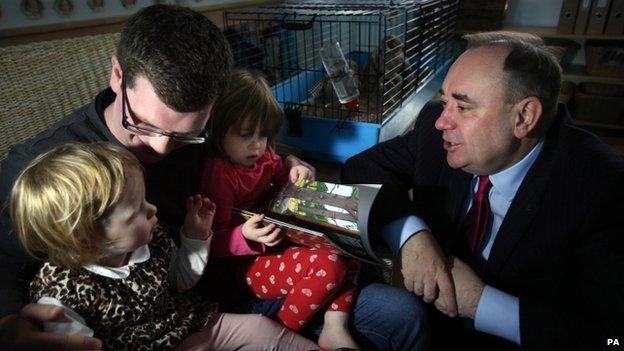Scottish independence: Childcare plan 'unworkable' without more funds
- Published
- comments
Private and voluntary sector nurseries say they are losing on average £1,000 per child per year
Plans to transform childcare in an independent Scotland would be unworkable unless private nurseries were given more funds, an industry body has claimed.
Purnima Tanuku of the National Day Nurseries Association said the current system could not deliver the expansion proposed by the Scottish government.
She called for a "fundamental change" now to the way nurseries were funded.
Scottish ministers said they would discuss ways to make their plan work.
A spokesman for the government said it valued the role of its delivery partners, including the National Day Nurseries Association (NDNA), and would discuss the "key challenges and opportunities of such a major expansion" with the nursery sector.
The Scottish government's White Paper on independence, external proposes 1,140 hours of free childcare - equivalent to 30 hours a week - for every three, four and vulnerable two-year-old by the end of the first independent parliament.
It adds that by the end of the second independent parliament, the plan would cover children over the age of one.
According to First Minister Alex Salmond, this "transformational shift" would encourage more parents - particularly women - to work, and would benefit the Scottish economy.
Under the current system, local authorities receive money from the Scottish government to fund 12.5 hours per week at state and some private or independent nurseries for children aged three and four.
This will increase to 16 hours per week in August, and is to be extended to vulnerable two-year-olds.
Although Ms Tanuku welcomed the substantial expansion in childcare outlined in the White Paper, she described the plan as "unsustainable" under current arrangements.
She explained that some local authorities did not pay the full rate charged by private nurseries, leading to a shortfall in funding that was ultimately passed on to parents.

Alex Salmond said an independent Scotland would see a transformational shift in childcare
The association chief executive also urged the Scottish government to change the system so that funding followed the child, rather than the local authority where the child lived.
Ms Tanuku believed such a move would lead to better funding for nurseries and more choice for parents.
She said private and voluntary sector nurseries in Scotland were losing an average of £1,000 a year, per child, on publicly-funded places.
Ms Tanuku told the BBC: "More than 90% of our nurseries reported making losses on the free places they provide.
"Not only is this a financially unsustainable position but it means [private] nurseries are effectively subsidising the system and that, in the long term, is unworkable.
"We support the Scottish government's plan, and independent providers would be at the heart of the expansion, but the underlying issue of funding must be addressed now."
She added: "Without a fundamental review, the plan would be unworkable."
Ms Tanuku blamed the "harsh financial climate" for councils not paying in full.
The average cost of 25 hours of childcare in Scotland is £101 per week for a child under two.
A Scottish government spokesman acknowledged that "key challenges" around the proposals were still to be finalised.
He added: "Partner providers are an essential and integral part of our current system of early learning and childcare and of course, every effort must be made to ensure provision meets local families' needs.

The Scottish government's White Paper plans 1,140 hours of free childcare for three and fours year olds
"While the Children and Young People Bill will support families' needs by putting flexibility and choice on a statutory footing for the first time, Scotland's Future [White Paper] sets out our ambitious vision for expanding childcare in Scotland even further.
"We will continue to work with key partners, including the NDNA, to discuss the key challenges and opportunities of such a major expansion."
A spokesman for Cosla, which represents Scotland's local authorities, said councils were doing their best with the "scarce resources" available.
He added: "There is a duty on councils through legislation to deliver childcare and early learning provision and it is for individual authorities to determine how they do that and whether this is best achieved through council provision or through use of partner providers.
"But which ever route means making the best use of the scarce resources at their disposal."